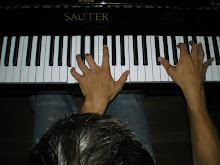One conception of music that i hope develops in the 21st century is the idea of music constructed without borders, without particular contries or nationalities or traditions defining them. This is inherently opposite from the modernist euro-centric conception of art-music/music art as a western and only western phenomenon and the rest of the worlds music output as a lesser category of "world music". Of course that concept is today known to be absurd, so instead, this is the idea that every music culture on earth had material to contribute to the learning of a musician and that these experiences are inherently valuable, and that judgments of inferiority should not be imposed upon non-European musical traditions.
This is not an argument about equality or inequality of the richness of musical traditions around the world, but the idea that music, as an artistic creation of individuals, is not something that has to be confined to specific traditions and instrumentation, and that learning is cross-cultural. This idea does not encourage some musical pastiche of style, but rather the understandings of the possibility of song forms and singing, instrumental or human.
I can imagine that my school on campus could offer classes on indian raga as well as piano performance, or west african drumming along side introduction courses to Gamelan. Today those wonderful subjects are all sort of grouped together in those "world music" sections, marginalized in a country which has grown less and less culturally Dependant on europe in the 20th century.
On a smaller scale, focusing in on the united states and canada, I suppose my hope for the 21st century is this : cultural dependence on europe will finally end and that a well grown hybrid and mixing will develop that would allow for a new musical environment that is not just older european or older east asian or middle eastern notions of music, but something that has absorbed both, and all, and comes up with something new and fresh.
Here in the US and Canada, we are living in (thank god) an increasingly diverse society with people coming from cultures completely different from those of the europeans that settled these two countries. Asian, African, Polynesian and Middle Eastern cultures are already mixing and enriching the lives of citizens in this country. Our music today should aim to reflect these wonderful changes and not just rely on older instrumentation, dispite its familiarity, and aim to speak a musical language that speaks to people, no matter where they're from.
I guess our problem is that a lot of people cant step out of our own generally white-European culture, into a different view, where musical traditions are not treated as superior or inferior, but just as matters of fact. One of things that bothered me in living in france was its mono-culture. Its one, singular self-absorbed culture that just doesn't invite others to the party. That was unbearable to me , and why i realized that i was glad to be American, and to be able to eat my pad thai one night and my chicken masala the next, to live in a country that doesnt (in principal) treat people with other ethnic and cultural origins as inferior.
Lahti
2 years ago
